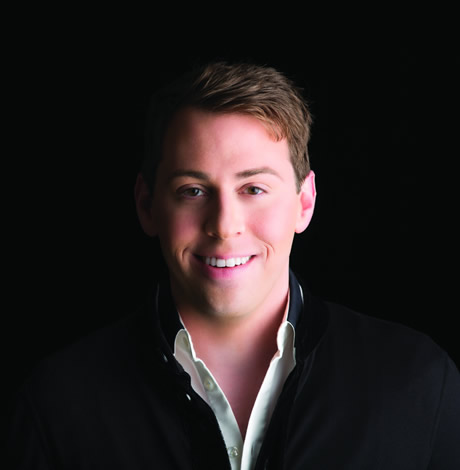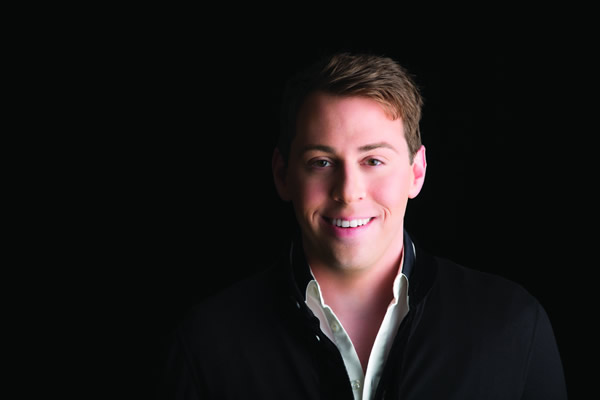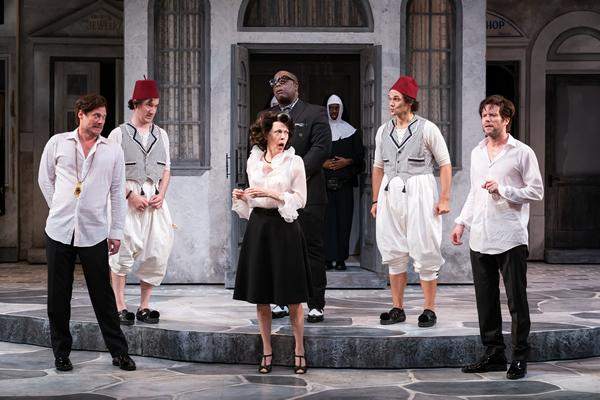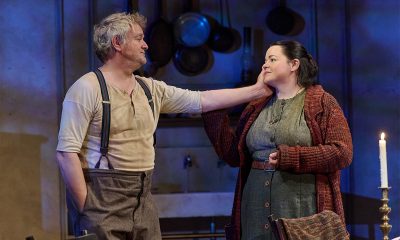Theater
Director Alan Paul enjoying frothy romp ‘The Comedy of Errors’
Theater bug bit Michael Kahn protege at young age


Alan Paul says a ‘60s Greek aesthetic has informed much of his work. (Photo courtesy STC)
‘The Comedy of Errors’
Through Oct. 28
Shakespeare Theatre Company
at Lansburgh Theatre
450 7th St., N.W.
$44-118
Director Alan Paul came out at just 15. He was the last of his group at performing arts camp to come clean on his sexuality. The rest had all come out at about 12, he says. Paul felt quite left behind. Certainly he’s never been behind professionally.
At 25, Paul was named Shakespeare Theatre Company associate artistic director under the auspices of legendary STC Artistic Director Michael Kahn. Now 34, Paul boasts an impressive CV crammed with work on classics, opera and musicals. He’s been nominated for several Helen Hayes Awards for directing and won for STC’s “A Funny Thing Happened on the Way to the Forum.” His more recent production of “Camelot” has broken STC box office records.
Growing up in nearby Potomac, Md., Paul made frequent trips to New York to see Broadway musicals. He loved “Sunset Boulevard” with Glenn Close as Norma Desmond but was verily obsessed with the London cast recording featuring Patti LuPone as the reclusive silent film star. From an early age, Paul longed to be a part of the theater world and struck up correspondences with many Broadway professionals. After graduating from Northwestern University where he was in the musical theater program, Paul returned to his hometown to pursue a career in earnest. He splits his time between Washington and New York where he’s often called to meet with designers and audition actors.
Currently, Paul is staging STC’s production of Shakespeare’s early work “The Comedy of Errors,” a farce jam-packed with slapstick and mistaken identity revolving around two sets of identical twins. A twin himself, Paul felt instantly at home with the work’s situations and possibilities.
Recently he took a break from tech week to talk about his latest directorial effort and other things.
WASHINGTON BLADE: I read that you wanted to plumb the work for its romantic and elegant elements. True?
ALAN PAUL: Those were early words. When you see the fart jokes you won’t think elegance. It’s a difficult play because it has to be funny but it also has to be about real people. The characters are searching for lost loved ones. The premise is deep. The comedy of it is what happens in the course of this crazy 24 hours. But there is elegance in the physical production. I wanted a mostly black-and-white set and costumes. I’m inspired by films from the early ‘60s like the Greek romantic comedy “Never on a Sunday” starring Melina Mercouri.
BLADE: Is it wrong to associate you primarily with musicals?
PAUL: I’ve directed many plays but musicals have been the most visible thing I’ve done. I love both. It’s fun to jump back and forth. In addition to Michael (Kahn), my heroes include Jack O’Brien. He directed “Hairspray” and “Henry IV” on Broadway in the same year. And Michael Blakemore who on the same night won Tony Awards for directing a play and a musical, “Copenhagen” and a revival of “Kiss Me, Kate,” respectively. People mistakenly think a director of musicals can’t be serious or real. Or a play director can’t be fun. I try really hard to play both sides of that. For “The Comedy of Errors,” we’re including some original music. It’s about creating that ‘60s Greek feeling. Also, the cast includes Eleasha Gamble who plays the courtesan and owner of the Porcupine Club. How could I not give her a song?
BLADE: You’re a twin. Has that been your way into “The Comedy of Errors”?
PAUL: Yes, I have a twin sister. For me, I understand the bond with my sister. The bond is different from what I have with anyone else. We share a sense of humor. If you looked at our text messages you’d have no idea what it means but we think it’s hilarious. Twins figure into so many of Shakespeare’s plays. I think Shakespeare had twins and one of them died. This play, and “Twelfth Night” especially, is about needing to find your other half. Shakespeare had a fantasy of family coming back together that never happened. I believe it comes from an extraordinary sense of loss.
BLADE: How did you go about casting twins?
PAUL: I’ve cast two sets of twins who look nothing alike. Put the same hat on them and who cares? We get it.
BLADE: Tell me about how Michael Kahn hired you.
PAUL: It was over drinks at Playbill Café. I miss that place so much. Not a big deal for him, but life changing for me.
BLADE: This is Michael Kahn’s last season at STC. What has he taught you?
PAUL: He pushed me very hard when I was very young to run the department. He gave me a lot of responsibility and expected me to know what I was doing. I figured out how to do it and I think that he gave me a lot of confidence early on. Also, I will take away his incredibly high standards. He won’t let anything go that does meet a certain standard. And I have that myself. An internal GPS that says “not good enough.”
BLADE: Will you work under Kahn’s appointed successor, Simon Godwin?
PAUL: That’s an ongoing conversation. I like him and am excited to see what he’ll do.
BLADE: Was directing The Comedy of Errors your choice?
PAUL: STC wasn’t doing a musical this season so I knew I’d do a play. I really wanted to do Shakespeare so Michael and I talked about a lot of different titles. Comedies to dramas. We hadn’t done this one in a long time. I thought it was a great way to open the season and I wanted to assemble a group of funny people that the audience would know. It’s always fun to have artists on stage together who have contributed to the success of STC. People like Tom Story, Nancy Robinette, Ted van Griethuysen, Sarah Marshall.
BLADE: And don’t forget Veanne Cox as Adriana.
PAUL: Yes, wait until you see her arguing with a parrot. She has a pet bird that talks to her.
BLADE: Last season you broke Shakespeare Theatre Company sales record with your production of “Camelot.” How do you explain that?
PAUL: The election. I’d been uncertain about doing “Camelot.” People love the music but not so much the book. But when Hillary Clinton lost the election, I couldn’t help but wonder what Obama was thinking about his legacy. That’s what King Arthur goes through at the end of the play. When the Round table is cracked he says that barbarism is the natural state of man. Then at the end of the scene he meets the kid and his spirit is revived. I thought that’s the story Washington needed to hear. And I was right.
BLADE: There are so many shows opening right about now. Why see “The Comedy of Errors”?
PAUL: Well, it’s short — 95 action-packed minutes. Nobody wants to see a really long play. With this production, you’re out in time to get drinks or supper. Also, it’s funny. In these times of the stressful news cycle, I want to give people some entertainment and joy.
BLADE: Tell me about your childhood letter writing.
PAUL: Yes, I have a whole book of correspondence, about one hundred letters. I started writing letter c/o the stage door when I was a kid. I wrote stage managers, a dance captain and actors like George Hearn. I have letters from Audra McDonald before she was famous. Bob Mackie wrote me. I wanted to know how things worked.
BLADE: How does being gay figure into your work?
PAUL: Freedom to have fun with sexuality. Someone in the show accused me of trying to make this into a John Waters’ movie. I said that’s a good thing. There’s lots of drag. Sarah Marshall plays a man, Dr. Pinch. Three men double as female characters.
BLADE Any directorial projects you’re itching to tackle?
PAUL Yes, two musical and a play. In keeping with my Greek ‘60s film thing, I’d like to do the musical “Zorba.” And another is “Golden Boy,” the musical based the Clifford Odets play about a young man from Harlem who pursues prizefighting despite his family’s objections. It needs a little doctoring, but I think that would make a wonderful Broadway revival. And the play is “Teenage Dick.” It’s got a provocative title but it’s actually a version of Shakespeare’s “Richard III” set in an American high school. It played at the Public Theater in New York this summer. Please someone in Washington let me do this. It will be a huge hit in this town, I’m certain.

The cast of ‘The Comedy of Errors,’ a brisk farce now on the boards at Shakespeare Theatre Co. (Photo by Scott Suchman; courtesy STC)

‘Uncle Vanya’
Through April 20
Shakespeare Theatre Company
Harman Hall
610 F St., N.W.
Shakespearetheatre.org
Shakespeare Theatre Company’s “Uncle Vanya” freshly rendered by director Simon Godwin and starring Hugh Bonneville in the title role, puts a pleasing twist on Chekhov’s tragicomic classic.
As disheveled, disheartened, and overworked Vanya, Bonneville is terrific. Though very different from the actor’s fame making role as Downton Abbey’s Lord Grantham, a proud, fastidiously turned-out aristocrat who presides over a manicured country estate peopled by a large staff, his Vanya is equally compelling
For “Uncle Vanya,” Chekhov imagines a house on a ragged estate in the Russian forest whose inhabitants display varying degrees of discontent brought on by the realization that they’re leading wasted lives. Middle-aged Vanya’s dissatisfaction and disappointment have been tempered by years of hard work. But all of that is about to be challenged.
With his plain and steadfast niece Sonya (Melanie Field), Vanya keeps the place going. And while barely putting aside a kopek for himself, he’s ensured that proceeds have gone to Sonya’s father Alexandre, a querulous academic (Tom Nelis), and his alluring, much younger second wife Yelena (Ito Aghayere) who live in the city.
When called to retire, the self-important professor and his wife economize by joining the family in the country. Overcome by the intense boredom brought on by provincial isolation, they’re not happy. Turns out, life in the sticks isn’t for them.
At the same time, the urban couple’s presence generates quite an effect on the rural household, changing the mood from one of regular work to idleness. What’s more, Vanya and family friend Mikhaíl Ástrov (John Benjamin Hickey), an unusually eco-aware, country doctor, are both bewitched by Yelena.
Meanwhile, young Sonya, who’s long carried an unrequited torch for Ástrov grows increasingly smitten. And while Yelena, who’s bored with her aging husband, expresses teasing tenderness with Vanya, she feels something more serious for Ástrov. It’s a whole lot for one house.
Superbly staged by Simon Godwin, STC’s artistic director, and performed by a topnotch cast, the very human production begins on an unfinished stage cluttered with costume racks and assorted props, all assembled by crew in black and actors in street clothes. We first see them arranging pillows and rugs for an outside scene. Throughout the play, the actors continue to assist with set changes accompanied by an underscore of melancholic cello strings.
With each subsequent scene, the work moves deeper into Chekhov’s late 19th century Russian world from the kitchen to the drawing room thanks in part to scenic designer Robert Brill’s subtle sets and Susan Hilferty and Heather C. Freedman’s period costumes as well as Jen Schriever’s emotive lighting design.
In moments of stillness, the set with its painterly muted tones and spare furnishings is a domestic interior from a moment in time. It’s really something.
Adapted by contemporary Irish playwright Conor McPherson, the work is infused with mordant wit, ribald comedy, and sadness. Like McPherson’s 2006 play “The Seafarer” in which the action unfolds among family, friends and others in a modest house filled with confrontation, laughter, resentment, and sadness. All on brand.
For much of “Uncle Vanya,” McPherson’s script leans into humor, funny slights, the professor’s pretentions, and Vanya’s delicious snarky asides; but after the interval, the play’s stakes become perilously heightened ready to explode with resentment and feelings of wasted potential, particularly frustrations expressed by Vanya and his intelligent but unfulfilled mother (Sharon Lockwood).
When it appears that mismatched couple Alexandre and Yelena are poised to depart, the house is struck with a sense of both relief and gloom.
Not everyone is disturbed. In fact, the family’s old nanny Nana (Nancy Robinette), and Waffles (Craig Wallace), a former landowner and now lodger on the estate, are elated. Both are eager to return to the pre-professor schedule of an early breakfast and midday lunch, and menus featuring simpler fare. They long for the return of the humble Russian noodle.
“Uncle Vanya”melds cynicism and hope. Like life, it’s a grasp at fulfillment.
Theater
Out actor Ángel Lozado on his new role in ‘In the Heights’
Lin-Manuel Miranda’s musical at Signature Theatre through May 4

‘In the Heights’
Through May 4
Signature Theatre
4200 Campbell Ave., Arlington, VA
Tickets start at $40
Sigtheatre.org
Before his smash hit “Hamilton” transformed Broadway, Lin-Manuel Miranda wrote “In the Heights,” a seminal musical set in an upper Manhattan barrio. Infused with hip-hop, rap, and pop ballads, the romance/dramedy unfolds over a lively few days in the well-known Latin neighborhood, Washington Heights.
Now playing at Signature Theatre in Arlington, “In the Heights” features handsome out actor Ángel Lozado as the show’s protagonist Usnavi de la Vega (named for a U.S. Navy vessel), a young Dominican American bodega owner who figures warmly in the center of the hood and the action.
A durable part that Lozado has wanted to play for some time, it’s proved the perfect vehicle to showcase his talents in a story that rings true to his heart.
WASHINGTON BLADE: Timing is very important to you.
ÁNGEL LOZADO: During rehearsal at Signature, our director James Vásquez said “In the Heights” finds you at a time when you need it. And that definitely resonates with me.
In the past I was up for Usnavi several times and then I was standby in the part for two weeks at the Muny in St. Louis but never called to go on.
And then, I lost my grandmother in January and was cast at Signature. In the show, the neighborhood loses their abuela [played by Rayanne Gonzales], I feel like I was meant to play the part at this moment. I’m a firm believer in the timing of it all.
BLADE: You’ve trained vocally at Florida State University, debuted on Broadway in “Bad Cinderella,” sang in “Jesus Christ Superstar Live (NBC),” and sung in many other musicals, but I’m guessing this is different?
LOZADO: Rapping is the most challenging part of the role. I’m trained in musical theater. I can sustain eight shows a week, but this is different. Rapping is more taxing. It’s challenging. With rap it’s clipped and the throat gets tighter.
BLADE: Like so much of Manhattan,Washington Heightshas changed a lot since 2008 when the show is set.
LOZADO: I currently live in Washington Heights and it’s very gentrified. Rents are high. I don’t think it was their intention to do a period piece but “In the Heights” is a period piece.
BLADE: And you grew up in Orlando, Fla., where before discovering theater, you were heavily into baseball.
LOZADO: I’m Puerto Rican, and baseball is a big part of our culture. My parents put me on a team at five, and I played first base through mid-high school. That was going to be a career. Went from one crazy career to another. When I got to high school, I was struggling with my queerness being in the sports world — struggled with my identity and the space I was in, I lost my love for baseball.
BLADE: How did you find your way to theater?
LOZADO: Through high school choir. It was a hard switch, but one that I couldn’t resist.
BLADE: You’ve been openly queer in the business. Has that ever been a problem?
LOZADO: I don’t know if it’s problematic or not. As actors, we don’t get behind the closed doors of casting. I do know that I’ve gotten to play lots of roles regionally that are straight men and that hasn’t been a problem.
Then again, I’ve cosplayed as a straight man most of my life. It makes me laugh when people see me offstage, they’re like, “Wow, you were really convincing as straight on stage.” I’ll take that compliment because that means I’m acting.
BLADE: Tell me about other roles you’ve played
LOZADO: Latin roles: Usnavi, Bernardo in “West Side Story,” Emilio Estefan in “On Your Feet!” and Che in “Evita.”And while I was thrilled to play those great parts, at the same time, I had friends getting auditions that weren’t specific to them being white, Black, or whatever. I worked with people who are more seasoned in the industry who had done 12 productions of “Evita.” I didn’t want to do that. I love representing my culture but I’d also like to do parts that have nothing to do with that. Dream roles include Sondheim’s “Sunday in the Park with George.”
BLADE: And how about a new work? Would you like creating a role on Broadway?
LOZADO: Oh yes, that’s the big dream.
BLADE: Do you think “In the Heights” might appeal to both Latin and queer audiences?
LOSADO: Yes.To see a people show themselves in a way that’s different from the stereotypes, telling our story in our own way, and not allowing the headlines define who we are, but to stand up in our joy.
“In the Heights” holds up the Latin community and, for me, that’s a parallel to the queer community, celebrating itself, especially in the upcoming time of WorldPride DC 2025 events (May 23-June 8).
Theater
Celebrated local talent Regina Aquino is back on the boards
Queer actor starring in Arena Stage’s ‘The Age of Innocence’

‘The Age of Innocence’
Through March 30
Arena Stage
1101 Sixth St., S.W.
Tickets start at $59
Arenastage.org
Actor, director, and now filmmaker, celebrated local talent Regina Aquino is back on the boards in Arena Stage’s “The Age of Innocence,” staged by the company’s artistic director Hana S. Sharif.
Adapted by Karen Zacarías from Edith Wharton’s 1920 masterpiece novel, the work surrounds a love triangle involving New York scion Newland Archer, his young fiancée, and the unconventional beauty Countess Olenska. The Gilded Age-set piece sets up a struggle between rigid societal norms and following one’s own heart.
Aquino — a queer-identified first-generation Filipino immigrant who grew up in the DMV— is the first Filipino American actress to receive a Helen Hayes Award (2019). She won for her work in Theater Alliance’s “The Events.”
In “The Age of Innocence,” Aquino plays Newland’s mother Adeline Archer, a widow who lives with her unmarried, socially awkward daughter Janey. No longer a face on the dinner party circuit, she does enjoy gossiping at home, especially with her close friend Mr. Sillerton Jackson, a “confirmed bachelor” and social arbiter. Together, they sip drinks and talk about what’s happening among their elite Manhattan set.
WASHINGTON BLADE: Do you like Mrs. Archer?
REGINA AQUINO: There’s a lot of joy in playing this character. She’s very exuberant in those moments with her bestie Sillerton. Otherwise, there’s not much for her to do. In Wharton’s book, it says that Mrs. Archer’s preferred pastime is growing ferns.
BLADE: But she can be rather ruthless?
AQUINO: When it comes to her family, yes. She’s protective, which I understand. When she feels that her family’s under attack in any way, or the structure of the society that upholds way of life is threatened, she leans hard into that.
The rare times that she’s out in society you see the boundaries come up, and the performative aspect of what society means. She can be very mean if she wants to be.
BLADE: Can you relate?
AQUINO: I come from a large Filipino matriarchal family. Mrs. Archer is someone I recognize. When I’m in the Philippines, I’m around people like that. People who will do business with you but won’t let you into their inner circle.
BLADE: Did you ever imagine yourself playing a woman like Mrs. Archer?
AQUINO: No. However, in the past couple of years diversely cast TV shows like “Bridgerton” and “Queen Charlotte” have filled a need for me that I didn’t I know I had.
With stories like “The Age of Innocence” that are so specific about American history, they aren’t always easily imagined by American audiences when performed by a diverse cast.
But when Karen [Zacarías] wrote the play, she imagined it as a diverse cast. What they’re presenting is reflective of all the different people that make up America.
BLADE: You seem a part of many groups. How does that work?
AQUINO: For me, the code switching is real. Whether I’m with my queer family, Filipinos, or artists of color. It’s different. The way we talk about the world, it shifts. I speak Tiglao in the Philippines or here I may fall into an accent depending on who I’m with.
BLADE: And tell me about costume designer Fabio Tablini’s wonderful clothes.
AQUINO: Aren’t they gorgeous? At the Arena costume shop, they build things to fit to your body. It’s not often we get to wear these couture things. As actors we’re in the costumes for three hours a night but these women, who the characters are based on, wore these corseted gowns all day, every day. It’s amazing how much these clothes help in building your character. I’ve found new ways of expressing myself when my waist is cinched down to 26 inches.
BLADE: Arena’s Fichandler Stage is theatre-in-the-round. Great for costumes. How about you?
AQUINO: This is my favorite kind of acting. In the round there’s nowhere to hide. Your whole body is acting. There’s somebody somewhere who can see every part of you. Very much how we move in real life. I find it easier.
BLADE: While the Gilded Age was opulent for some, it wasn’t a particularly easy time for working people.
AQUINO: The play includes commentary on class. Never mind money. If you’re not authentic to who you are and connecting with the people you love, you’re not going to be happy. The idea of Newland doing what he wants, and Countess Olenska’s journey toward freedom is very threatening to my character, Mrs. Archer. Today, these same oppressive structures are doing everything here to shutdown feelings of liberation. That’s where the heart of this story lands for me.
-

 District of Columbia3 days ago
District of Columbia3 days agoReenactment of 1965 gay rights protest at White House set for April 17
-

 Maryland3 days ago
Maryland3 days agoFreeState Justice: Transgender activist ‘hijacked’ Moore’s Transgender Day of Visibility event
-

 Hungary3 days ago
Hungary3 days agoHungarian MPs amend constitution to ban public LGBTQ events
-

 Real Estate4 days ago
Real Estate4 days agoNavigating DMV real estate market during political unrest












